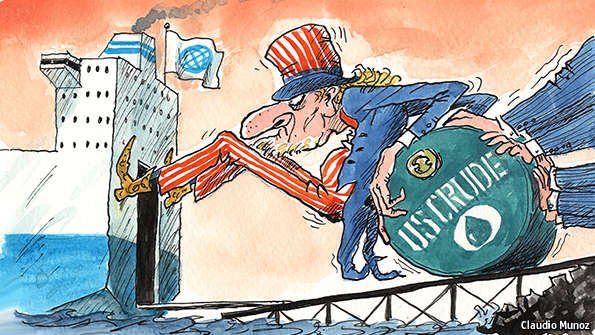The Government Finally Admits it is Wrong on Oil Economics

The Government Finally Admits it is Wrong on Oil Economics
By: Patrick Hedger, Policy Director-American Encore
During the energy crises of the 1970s, the federal government instituted a ban on crude oil exports in an attempt to insulate American consumers from international pressures on the energy market. This type of policy making is what renowned economist Dr. Thomas Sowell refers to as “Stage One Thinking” as it only serves a narrow interest in the short-run while ignoring long-run consequences.
The consequences of the export ban are that it keeps American gas prices artificially high, subsidizes gas prices for global consumers, and suppresses demand for domestically produced petroleum. For years, especially with the higher-than-average gas prices of last decade, economists have argued that the oil export ban is self-inflicted pain at the pump. Yet the federal government has stood ignorantly by this policy. Just this year, Secretary of Energy Ernest Moniz claimed, “I don’t think an overly compelling argument has been made on the basis of pragmatic economics,” for lifting the ban.
That’s a grossly inaccurate statement. The most basic economic understanding would inform you that any sort of trade restrictions on common commodities or consumer goods have negative economic repercussions on net while only benefitting certain constituencies. In the case of the crude oil export ban, the only beneficiaries are American oil refineries. The reason that the export ban doesn’t help the average American at the gas pump is that you don’t fill up your car with crude oil, you fill it up with refined gasoline. There is no similar restriction on gasoline or other refined products, which means American refineries can sell on a global market where American consumers compete with foreign consumers. Crude oil producers enjoy no such luxury, as they are forced to sell exclusively to American refineries. This naturally suppresses the ultimate price producers can command. Lower prices reduce the incentive to explore for and produce domestic crude oil.
If the ban is lifted, Americans would benefit not only from the increased economic activity and jobs associated with additional domestic oil exploration and production, but they would also benefit from the increased crude oil supply on the global market. Basic economics tells us that increased supply would put downward pressure on the price of gasoline, which, again, is bought and sold on a global market without the similar restrictions placed on crude oil by the US government.
Despite previous stubborn opposition to these basic economic principles, the federal government seems to be finally changing its tune. The Energy Information Agency, a statistical analysis agency within Secretary Moniz’s Department of Energy (DOE) recently released a report that admitted lifting the oil export ban would likely lower gas prices, just as outside economists and analysts have claimed. While this conclusion is less-than shocking, given the obvious economic forces at play, it is a huge victory in terms of ultimately repealing this backwards policy.
With the DOE finally admitting what we’ve long known, Congress should move to immediately lift this unnecessary burden on the energy market and American consumers by repealing the oil export ban.
Read more about the oil export ban and why it should be repealed in American Encore's Blueprint for 2015 here.







